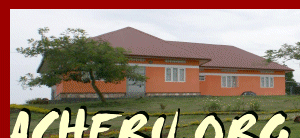| April
2018 report |
| I've been looking at some of the information in an initial draft of the Acheru annual report. Their stated vision is 'to be the leading Christian based rehabilitation unit' and this influences everything they do. In 2017 a total of 1742 children were treated there, 184 of whom required surgery. The operations were carried out by CoRSU at heavily subsidised rates. Our relationship with them is very important and I intend to give more details of this in another report. |
| Children were treated for a wide range of conditions, the most common being cerebral palsy and club feet. At Acheru many children have club feet corrected without surgery, with most being treated as outpatients. There's a high success rate, particularly if the parents are co operative and keep follow up appointments. The Acheru staff have a lot of experience with cerebral palsy. We don't see cures, but what we do see is a significant improvement in the child's quality of life when we can involve the parents in an ongoing programme of exercises etc. A major problem for children with cerebral palsy is that because the child is perceived to be disabled they are not seen as having any potential, are ignored and given no stimulus, and their development is severely stifled. A change of attitude is essential, and here we really see the importance of the Community Based Rehabilitation work with potential for dramatic change and a steady shift in attitudes. |
| Osteomyelitis continues to be very common and takes up a great deal of Acheru time and resources. What may start out as a minor injury can go untreated for years resulting in deep rooted infection which may require surgery and a lengthy programme of rehabilitation. It's distressing to see the number of children who continue to endure such suffering, perhaps over a very long period, due to neglect, lack of understanding, or misplaced intervention by traditional healers or witch doctors. They need medical treatment which we can provide but first of all we have to find them, so again we see the importance of the community work. |
| Acheru isn't a hospital but of course many of the children there can suffer from common illnesses as well as whatever conditions they were admitted for. These may also be treated in Acheru or can be referred to Mukono hospital or CoRSU if necessary. The hospital in Mukono was originally a health centre administered by Mengo hospital. When it was handed over to the Church of Uganda it was upgraded to a hospital and I helped to equip an operating theatre among other things. I first visited the unit in 1984, and it's pleasing to see it continue to provide a service to a town which has grown substantially. |
| Much of the work of the nurses at Acheru involves daily wound care, especially with osteomyelitis patients requiring dressing changes. In 2017 the nurses carried out 3513 sessions. Central to rehabilitation of Acheru patients is physiotherapy, and a total of 745 sessions were conducted during the year. |
| Psycho social support is important too, many patients coming with a very negative attitude. They may have lost hope and feel they have no support and the social worker, along with the rest of the staff, helps to prepare parents and children before treatment. They can then be followed up through the CBR programme. A significant development in their work over the last year has been the CBR workshop where equipment is produced for disabled children. Visits from the CBR team are very much appreciated in the community with patients being followed up, children identified as needing treatment, and an ongoing effort to address attitudes to disability. |
| Children treated for longer periods at Acheru attend classes there to minimise disruption to their education, although it isn't easy with such a range of abilities as well as several different languages. 103 children were taught there in 2017, although it is usual at Acheru for all the children to be engaged in a range of activities, sometimes with help from university students. |
| Central to everything done there is the Christian ethos of Acheru and an active programme is conducted by the staff, representatives from local churches, students from Uganda Christian University, and by other visitors. Acheru has outgrown the old 'family' atmosphere, but it's still a place where people from all backgrounds are made to feel comfortable and at home, and perhaps come to understand more of why we conduct this work. |
| I don't want to make it sound as if everything always runs smoothly. Problems arise, resources are stretched, but we try to work closely with the staff to ensure high standards are maintained. We've so much to be thankful for, not least the support which continues to make it all possible, and I hope to report soon in more detail on issues arising from the recent evaluation and what we may try to do to help with any recommendations. |
| Brian Dorman |



